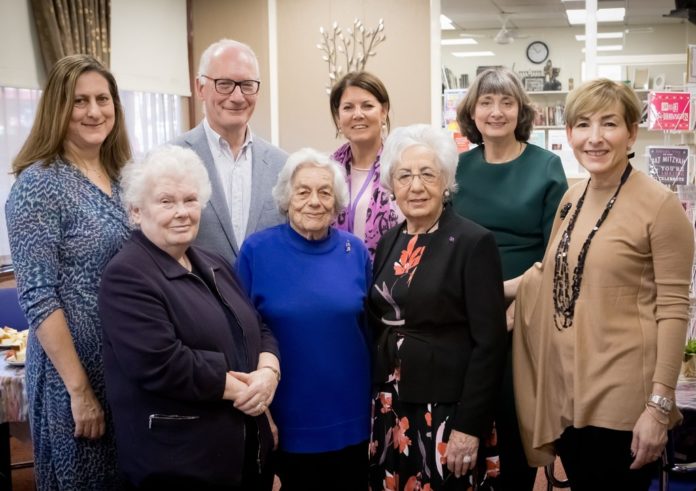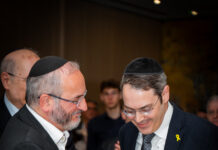
Members of Jewish Care’s Holocaust Survivors’ Centre gathered for a celebratory tea to mark the awarding of New Year’s Honours by Her Majesty the Queen to Holocaust survivors. Cirla Lewis and Vera Schaufeld received Member of the Order of the British Empire honours for services to Holocaust Education. British Empire Medals were given to Helen Aronson BEM, Taube Biber BEM, Eva Clarke BEM, Steven Frank BEM and Joanna Millan BEM for services to Holocaust Education.
Together with members, volunteers and staff at the Centre, Taube Biber BEM, Vera Schaufeld MBE, Helen Aronson BEM and Joanna Milan BEM were able to attend the tea which took place at Jewish Care’s Holocaust Survivors’ Centre in Hendon.
Vera Schaufeld MBE who now lives in Wembley came to the UK on Kindertransport when she was nine years old, leaving her family in Czechoslovakia. Vera became a teacher and has dedicated her life to teaching children with little or no knowledge of the English language, later working with teachers. The grandmother of four was involved in the establishment of the Holocaust Centre and Beth Shalom Museum in Nottingham and has frequently spoken across the UK about her experiences to schools and colleges, promoting a message of tolerance, particularly in recent years working with the Holocaust Memorial Day Trust’s and the Holocaust Education Trust.
Vera said, “Survivors haven’t had easy lives but it makes a huge difference knowing staff and volunteers are here at the Centre. They are ready to listen and help. Here we can relax and be amongst friends. My husband and I were founder members of the Cnetre so we have been here since it started and came often. The Centre has always been here for us. My best experience in Holocaust education was being introduced by Michael Gove for a talk in the Home Office. It meant that I could call for help needed by children today. who are refugees from war torn countries, to find the same refuge that was given us.
Helen Aronson BEM was born in Pabjanice in Poland and was one of just 750 people who survived the notorious Lodz Ghetto. Her father was murdered with a group of children he was looking after at the Chelmo extermination camp. Helen moved to London in 1946, where she joined her uncle in London and learnt English. She married, worked as a secretary and had two daughters. Helen shares her wartime experiences with others, particularly young people, in the hope of fostering tolerance. She began talking about her experiences in xxx he regularly speaks to schools and other groups across the UK.
Helen said, “When I received the letter from the Cabinet Office addressed to my great surprise I was told I had been nominated. I hope that the work in Holocaust education, especially with children, is important to them and that I will continue to do that for a long time.”
Joanna Milan BEM was born Bela Rosenthal in August 1942 in Berlin. Orphaned at 18 months, her father was murdered at Auschwitz-Birkenau and her mother died of tuberculosis in Theresienstadt. After being liberated, Bela was flown to England, along with 299 other surviving orphans to live in children’s homes with other child survivors, before being adopted by a Jewish couple from London who changed her name to Joanna. She married and had three children and later came to discover much of her family’s history, finding living relations all over the world. Joanna speaks regularly today about her experiences during the Holocaust.
Joanna Milan BEM said, “I was surprised to be nominated and my family are very proud. I feel an obligation to do what I do. The work is so important to me. It’s an obligation and we know that history is being rewritten and distorted, so we see programmes on TV but only people like me can say how things really happened.”
Tauba Biber BEM now lives at Jewish Care’s Lady Sarah Cohen House in Friern Barnet and has been a resident there for the last 18 months. She was born Tauba nee Trompeter in Mielec, Poland and came from a large Orthodox Jewish family with seven children, five sisters and two brothers. Only Tauba and two of her brothers survived the Holocaust. Taube and her sister were taken to Warsaw Ghetto and Plaszow Camp and sent on a death march from Auschwitz to Bergen-Belsen death camp. Eight days after Liberation, in April 1945, Tauba’s sister, who had been healthy, passed away. Tauba was taken to hospital with typhus and recovered. In 1945, she met her future husband Max, also from Mielec and went on to give talks in Holocaust education.
Aviva Trup, Manager of Jewish Care’s Holocaust Survivors’ Centre, said, “I’d like to congratulate our members who have received New Year’s Honours from The Queen. These honours recognise the commitment shown by each of the survivors who have dedicated themselves to giving their testimonies to ensure that the next generation hears what happened in the Holocaust and that it will never be forgotten or happen again. The tea gives us an opportunity to celebrate the achievement of the members and survivors who have been awarded the honours at Holocaust Survivors’ Centre, where all of our members can feel secure and welcome by others who understand what they have experienced.”
For more information contact Naomi Creeger on 020 8922 2812 or ncreeger@jcare.org
Notes to Editors
Jewish Care’s Holocaust Survivors Centre (HSC) is a Jewish social centre for survivors who were in Europe during the Second World War or came to the UK as refugees after November 1938 and on the Kindertransport. Over 600 people use Jewish Care’s Holocaust Survivors’ Centre services.
The Centre is entirely funded by the charity and is the only centre designed specifically for Holocaust survivors in the UK offering a wide range of social activities six days a week, Sunday to Friday. It offers a friendly, safe place where elderly survivors meet and socialise and where they can benefit from a full therapeutic programme. The centre also supports survivors who wish to share their stories with others to educate the next generation about the Holocaust.
Housed in the same building is the Shalvata centre offering practical and emotional therapeutic support to those who survived the Nazi Holocaust along with others who have survived more recent conflicts.
Jewish Care is the largest health and social care charity for the UK’s Jewish community, touching the lives of 10,000 people every week.
The organisation provides a wide range of services for older people, people with disabilities, mental health needs, visual impairment, as well as Holocaust survivors and refugees. Jewish Care also offers support and guidance to families, carers and the bereaved, as well as programmes for children and young people.









